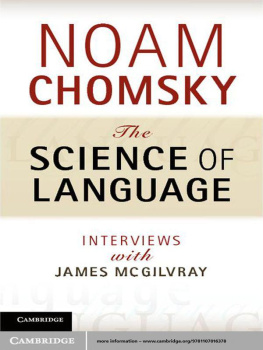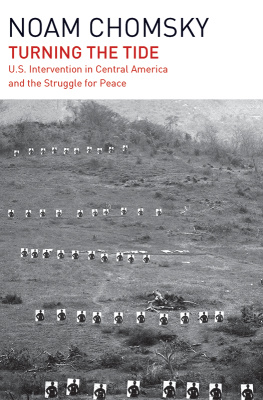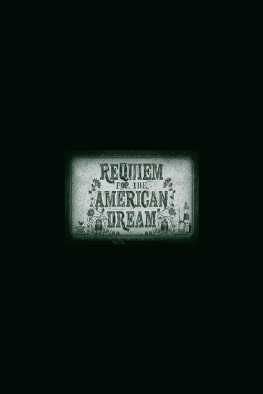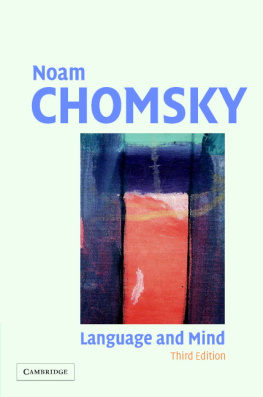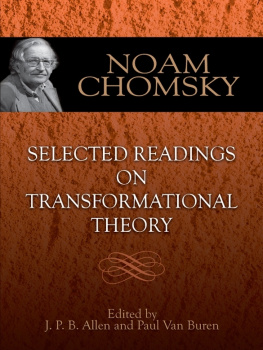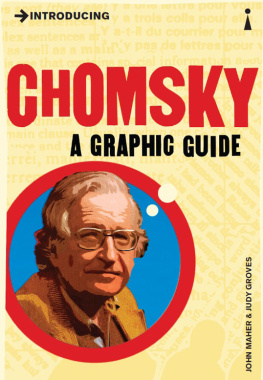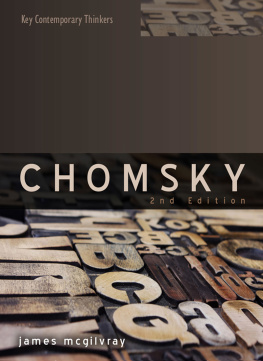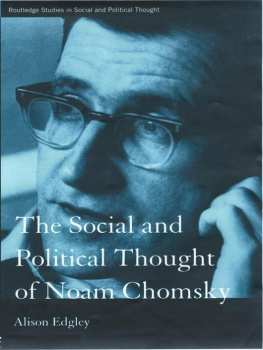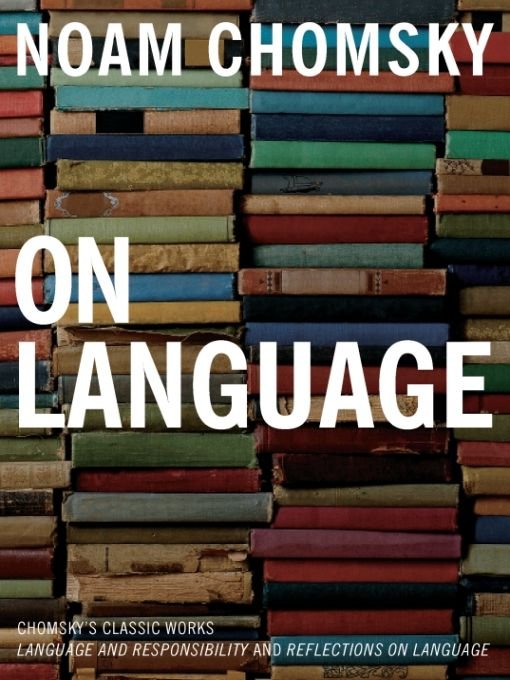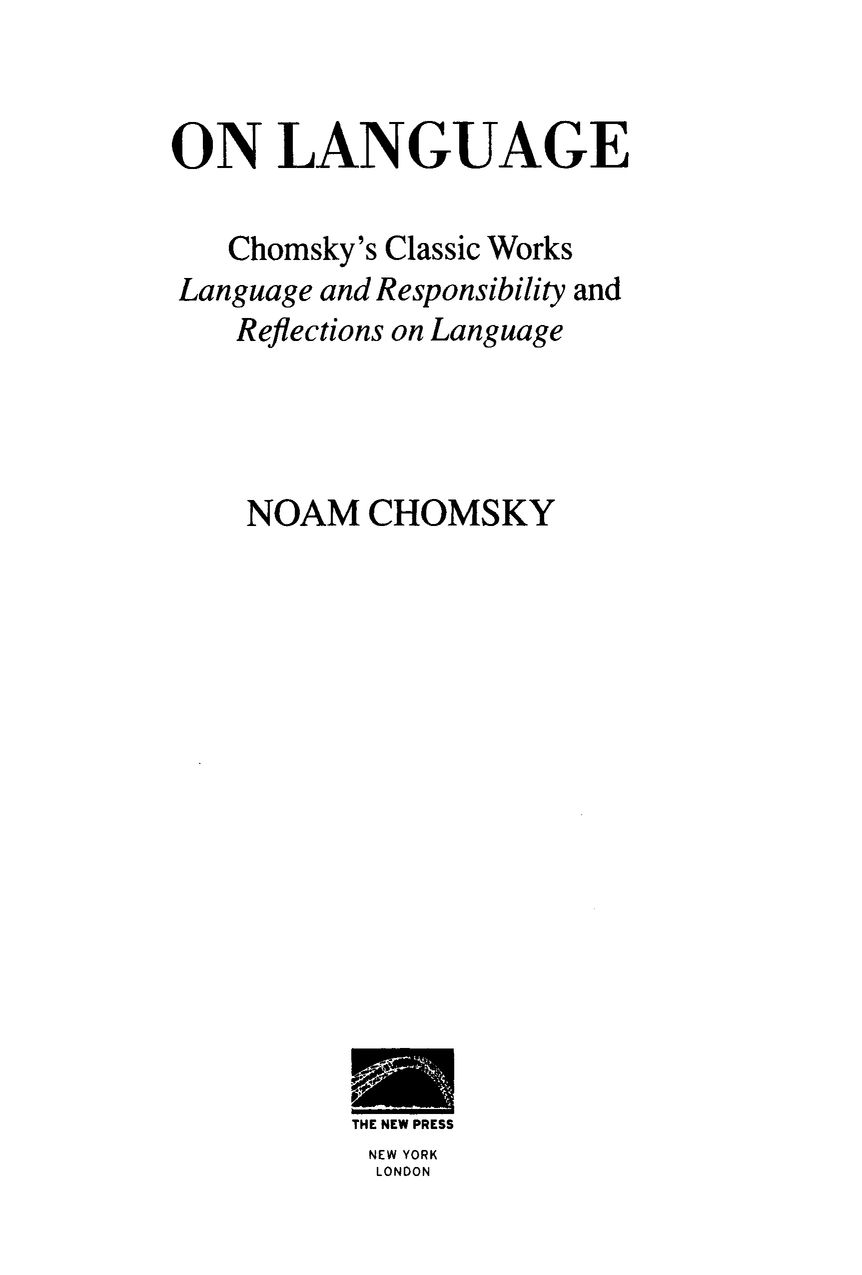Table of Contents
Language and Responsibility
Translators Note
That my name appears as translator of a book by Noam Chomsky into English obviously requires an explanation.
The origin of this book lies in conversations between Chomsky and the French linguist Mitsou Ronat, carried on in English on his part, in French on hers. The conversations were recorded on tape, and Mitsou Ronat published them in France after translating Chomsky into French (Noam Chomsky, Dialogues avec Mitsou Ronat, Paris, 1977).
When Pantheon then planned publication of this book in the United States, Chomsky asked me to prepare an English version. As the passages contributed by Mitsou Ronat were originally in French, these constituted a straightforward task of translation. However, the French translation of Chomsky presented quite a different problem. The original tapes were no longer available. I felt a bit as if, say, one of Shakespeares plays had been lost and only the (very excellent) German translation of Schlegel and Tieck had survived, and the problem now was to prepare an English text on that basis. The task was rendered somewhat less formidable by Chomskys willingness to go over my translation very carefully and to correct it. As it turned out, in doing so he also made substantial revisions in the text.
Thus, as far as this portion of the bookthe major portion by faris concerned, what the title page should actually say is: reconstructed with the aid of... rather than translated by.... Of course, it is possible that in spite of the great pains he took, some errors still escaped Chomskys notice; for these, Im afraid, I must accept entire responsibility.
In spite of these difficulties, I enjoyed the work more than any translation I have ever undertaken: because of the contentthe first chapter on political questions and on the student movement of the 1960s said so many things which needed to be said and also because I believe the book presents the clearest exposition yet of Chomskys basic conceptions in linguistics and related issues in philosophy, psychology, and social studies. It offers an excellent introduction to those not familiar with Chomskys linguistic work and the generative grammar approach. At the same time, it provides a comprehensive overview of the various aspects of generative grammar and the present state of research that should be of interest to linguists, philosophers, and others who have more familiarity with these questions.
Introductory Comment
The material that follows is based on conversations held in January 1976, conducted partly in French, partly in English. The transcript was published in French translation in 1977. Retranslation into English posed a number of problems, among them, the difficulty of reconstructing the original. In the course of reviewing the translation I introduced a number of stylistic and sometimes substantive changes, adding passages to clarify or extend what was said. Thus the present book, while preserving the basic structure of the original, is not simply a translation of the French translation of my remarks, but is rather an elaboration and in some cases modification of the French version.
Noam Chomsky
Cambridge, Mass.
April 1978
PART I
Linguistics and Politics
CHAPTER 1
Politics
M.R.: Paradoxically, your political writings and your analyses of American imperialist ideology appear to be better known, in France as well as in the United States, than the new discipline which you have created: generative grammar. That poses the question: Do you see a link between your scientific activitiesthe study of languageand your political activities? For example, in the methods of analysis?
N.C.: If there is a connection, it is on a rather abstract level. I dont have access to any unusual methods of analysis, and what special knowledge I have concerning language has no immediate bearing on social and political issues. Everything I have written on these topics could have been written by someone else. There is no very direct connection between my political activities, writing and others, and the work bearing on language structure, though in some measure they perhaps derive from certain common assumptions and attitudes with regard to basic aspects of human nature. Critical analysis in the ideological arena seems to me to be a fairly straightforward matter as compared to an approach that requires a degree of conceptual abstraction. For the analysis of ideology, which occupies me very much, a bit of open-mindedness, normal intelligence, and healthy skepticism will generally suffice.
For example, take the question of the role of the intelligentsia in a society like ours. This social class, which includes historians and other scholars, journalists, political commentators, and so on, undertakes to analyze and present some picture of social reality. By virtue of their analyses and interpretations, they serve as mediators between the social facts and the mass of the population: they create the ideological justification for social practice. Look at the work of the specialists in contemporary affairs and compare their interpretation with the events, compare what they say with the world of fact. You will often find great and fairly systematic divergence. Then you can take a further step and try to explain these divergences, taking into account the class position of the intelligentsia.
Such analysis is, I think, of some importance, but the task is not very difficult, and the problems that arise do not seem to me to pose much of an intellectual challenge. With a little industry and application, anyone who is willing to extricate himself from the system of shared ideology and propaganda will readily see through the modes of distortion developed by substantial segments of the intelligentsia. Everybody is capable of doing that. If such analysis is often carried out poorly, that is because, quite commonly, social and political analysis is produced to defend special interests rather than to account for the actual events.
Precisely because of this tendency one must be careful not to give the impression, which in any event is false, that only intellectuals equipped with special training are capable of such analytic work. In fact that is just what the intelligentsia would often like us to think: they pretend to be engaged in an esoteric enterprise, inaccessible to simple people. But thats nonsense. The social sciences generally, and above all the analysis of contemporary affairs, are quite accessible to anyone who wants to take an interest in these matters. The alleged complexity, depth, and obscurity of these questions is part of the illusion propagated by the system of ideological control, which aims to make the issues seem remote from the general population and to persuade them of their incapacity to organize their own affairs or to understand the social world in which they live without the tutelage of intermediaries. For that reason alone one should be careful not to link the analysis of social issues with scientific topics which, for their part, do require special training and techniques, and thus a special intellectual frame of reference, before they can be seriously investigated.
In the analysis of social and political issues it is sufficient to face the facts and to be willing to follow a rational line of argument. Only Cartesian common sense, which is quite evenly distributed, is needed... if by that you understand the willingness to look at the facts with an open mind, to put simple assumptions to the test, and to pursue an argument to its conclusion. But beyond that no special esoteric knowledge is required to explore these depths, which are nonexistent.




